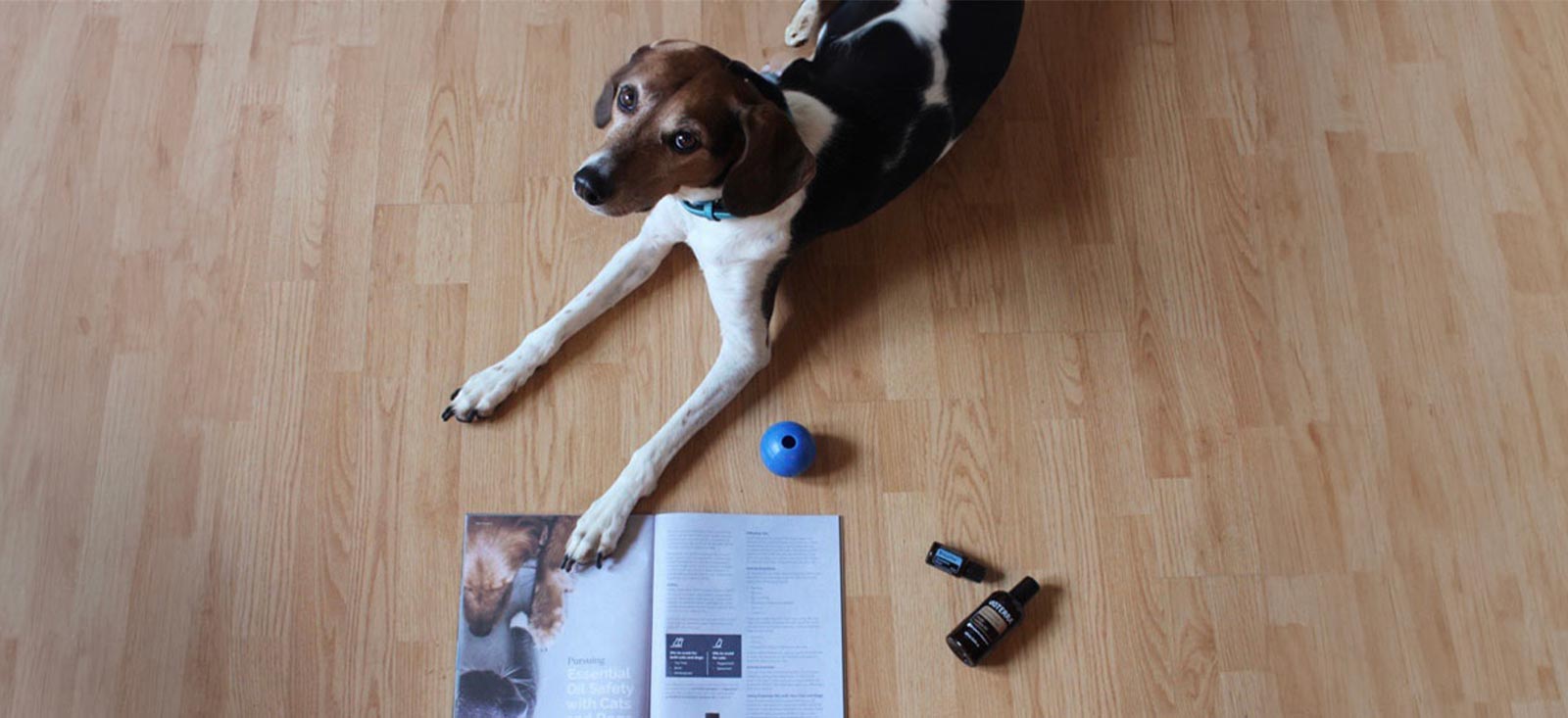Origin: a Latin derivative
meaning "Gift of the Earth."
- Shop
-
Our Story
- View Our Story Home
- Who We Are. . . .
- What We Do. . . .
- Why We Do It. . . .
-
dōTERRA[doh-teh-ruh]
The Good, The Bad, and the Aromatic: Essential Oil Do’s and Don’ts for Pet Owners
By Dr. Janet Roark, Veterinarian
By Dr. Janet Roark, Veterinarian


“Essential Oils are Toxic to Pets!” Maybe you have seen this blasted all over the internet. Maybe you have even been told this by well-meaning friends or family. Maybe you just aren’t sure and just want to be extra careful around your favorite feline or precious pooch. The truth is, it’s smart to be careful with essential oils around our beloved furry family members. There are a LOT of adulterated oils on the market today, and the majority of the information out there regarding pets and essential oils is based on the use of these oils that don’t follow the same testing and quality standards that doTERRA does. Just like you wouldn’t use just any essential oil from the grocery store with yourself or your kids, the same is true for your pets. Adulterated oils are not safe for pets OR people!
The great news is that doTERRA essential oils are not adulterated, far from it, and have been proven time and time again to greatly benefit both people and pets alike in the homes of doTERRA essential oil enthusiasts. Additionally, they have a team of incredible veterinarians that want more than anything to educate YOU about how to safely and effectively use essential oils in your home and around your animals. We want your pets to benefit from the incredible power of doTERRA Essential Oils, too!
This simple list of Do’s and Don’ts can help your pets live their best lives in your doTERRA-filled home…
Do:
- Only use CPTG® Essential Oils!
- Dilute Essential Oils prior to topical application with pets.
- Pro tip: the doTERRA Kids and doTERRA Touch® roller bottles are already purr-fectly diluted for this!
- Diffuse around your pets! Use 3-6 drops of essential oil in your diffuser and be sure the room door is open or it’s in a large room in your home so the pets can leave if it’s an oil they don’t particularly care for.
- Observe your pet’s behavior when using or diffusing essential oils – they can’t use words to tell us how they feel, so they use their behavior and body language instead. They will “tell” you what they like or don’t like if you learn to “listen” by paying attention.
- Use a little bit of extra caution with very young, nursing, or pregnant animals. You can still use oils around these animals, just dilute more heavily or stick with diffusion.
- Use a water diffuser or one on a motion sensor rather than an oil that pulls directly from the bottle going all day long. An intermittent setting is the best option if you have it available!
- Introduce essential oils gently to your pet – allow them to choose which oil they prefer.
- Store your oils in a place where your pets can’t steal them. In a closed drawer or a closed storage box or bag is best.
- Contact your veterinarian if your pet exhibits abnormal behavior or has an illness.
Don’t:
- e afraid of using doTERRA oils around your pets! They can greatly benefit from them just like you and the rest of your family.
- Use plain water to remove an essential oil – rather, use a carrier oil such as Fractionated Coconut Oil to dilute it out, then a shampoo to remove any excess oil from the fur.
- Apply large amounts of essential oil at one time. More diluted, more frequently, is the best rule to follow instead.
- Use essential oils at the same time in the same place as a topical medication.
- Give your pet ANY product containing xylitol. This includes toothpaste, beadlets, gum, mouthwash, or DigestTab®
- Worry or panic if your pet has skin irritation or an adverse reaction. These are incredibly rare and typically resolve within 24 hours. Put some doTERRA Balance® on yourself and monitor your pet.
- Use essential oils on or in the nose, down into the ear canals, in the eyes, around the anus or genitals, or near other sensitive areas of an animal.
- Use Tea Tree, Wintergreen, or Birch topically or internally with cats or dogs.
- Add essential oils to your pet’s water dish. It sits on top of the water, and may discourage them from drinking, so it’s not the best practice especially if you have cats in the home.
Finally, when introducing essential oils to your pet, always remember to go S-L-O-W-L-Y
- S = Self – Selection – allowing your pet to choose which oil they prefer. You may be surprised which one they choose! Maybe instead of Lavender, they prefer Roman Chamomile or Vetiver. Or instead of Frankincense, they are obsessed with Copaiba! Let them communicate their preferences to you!
- L = Lid ON to see if they reach toward it or it is an oil they don’t care for that day. This may change on a day-to-day basis so it’s okay to re-introduce an oil if they didn’t choose it previously. Sometimes they only choose oils they need that day.
- O = Observe your pet's responses – let them tell you – remember this is with body language and behavior typically.
- W = Watch your pet for the first 5-10 minutes of diffusing or applying a new oil you haven’t used before around that animal. Be sure to leave the room door open so they can leave if they wish, and make note that if they do, that might not be their favorite aroma.
- L = Less is sometimes more. Start out more diluted and remember you can always apply more if you need to.
- Y = Your pet is a unique individual, some are more sensitive, some are less sensitive, some LOVE oils, some are more cautious, and just like people – they like different things!
If you follow these simple guidelines, you will be amazed at how wonderful essential oils can be for pets in your home! From calming during fireworks or a thunderstorm because you’re diffusing some lavender, to senior pet support with Copaiba, Frankincense and Turmeric. Your pets will thank you for bringing comfort to their lives, too.
For more information about essential oils and pets visit these resources:
Episode 45: Ask the Vets: Essential Oils for Your Pets
-
Copied to clipboard
- Download


